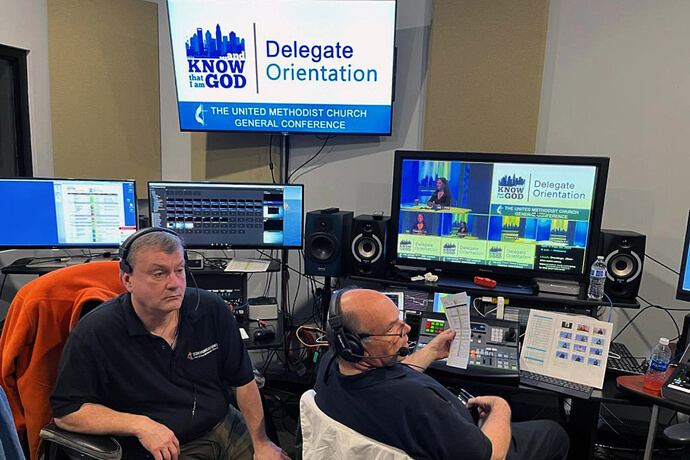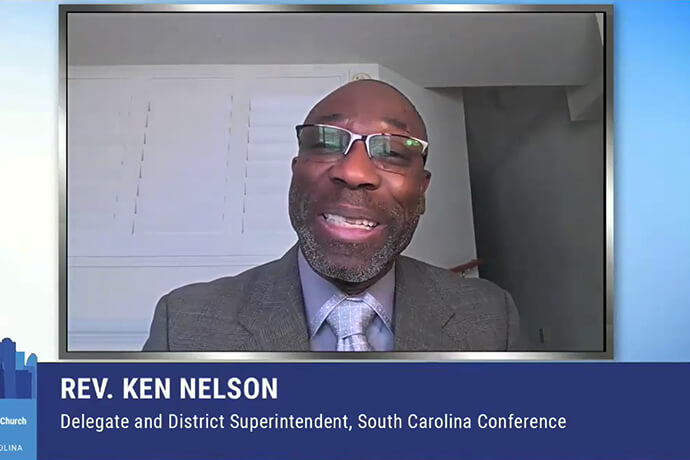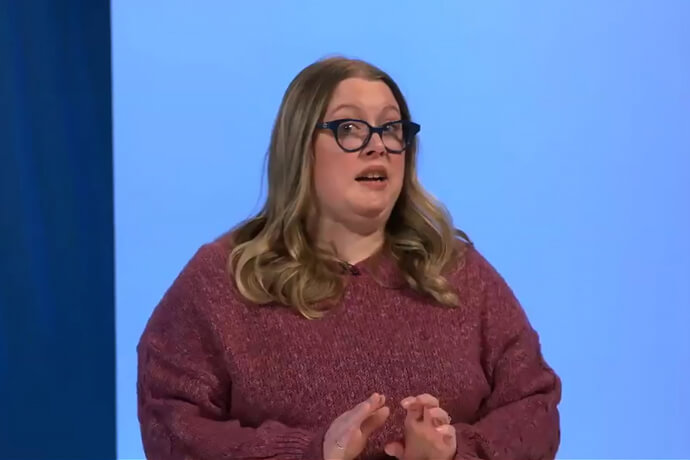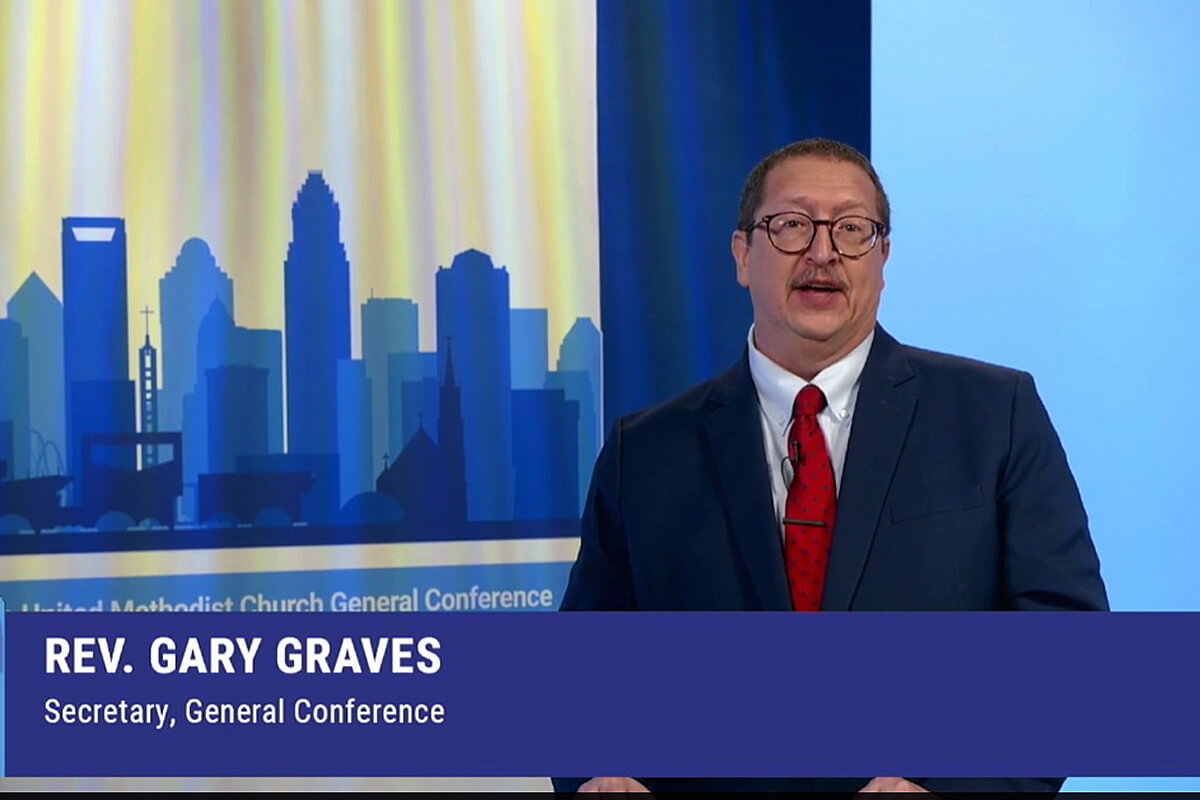Key Points:
- A two-day online orientation gave delegates and other observers a preview of what to expect at The United Methodist Church’s top legislative assembly.
- The pandemic-delayed General Conference comes at a seminal moment in the life of this denomination seeking to move beyond recent challenges.
- This first of two United Methodist News stories on the orientation looks at the international General Conference’s logistics and order of business.
Hundreds of United Methodists around the globe are preparing to spend two weeks away from home, work and family to serve as delegates at General Conference.
“I know it is a sacrifice and an effort, which only God can bless,” said Kim Simpson, the chair of the commission that plans the denomination’s top policymaking assembly.
She was speaking at the opening of the Feb. 29-March 1 livestreamed General Conference orientation, co-hosted by United Methodist Communications and the Rev. Gary Graves, General Conference secretary.
The two-day session offered a preview of what to expect at General Conference, both in terms of its logistics and proposed legislation. After three postponements caused by the pandemic, the international gathering is now slated for April 23-May 3 in Charlotte, North Carolina. The theme for the gathering will be “…and know that I am God” from Psalm 46.
General Conference is always a major undertaking with delegates and other church leaders coming from four continents. But planning for the big meeting has been made more complicated by not only COVID’s disruptions but also the exit of about a quarter of U.S. churches under a General Conference-approved provision that expired at the end of last year.
It will be up to the delegates to prayerfully make the decisions that will chart where the denomination goes from here.
“Undoubtedly, The United Methodist Church faces significant challenges,” said Simpson, who is also a delegate herself from the Central Texas Conference. “But I firmly believe that God can bring forth blessings, even from the most trying circumstances.”
This first of two stories looks at plans for ensuring General Conference delegates have what they need to attend the gathering and what order of business they can expect during their time there.

Delegates
Plans call for the coming General Conference to have 862 voting delegates — 55.9% from the U.S., 32% from Africa, 6% from the Philippines, 4.6% from Europe and the remainder from concordat churches that have close ties to The United Methodist Church.
In addition, some autonomous, affiliated Methodist churches will send delegates who have voice but no vote.
The denomination’s annual conferences — regional bodies consisting of multiple congregations — elect the United Methodist voting delegates. The denomination’s constitution requires that half are clergy and half lay.
Annual conference secretaries certify the election of delegates. General Conference delegates also serve as delegates to their respective U.S. jurisdiction or central conference in Africa, Europe or the Philippines — the bodies that elect bishops. Annual conferences also elect a slate of delegates who serve as additional jurisdictional or central conference delegates as well as General Conference reserves.
Subscribe to our
e-newsletter
Amid the delays and disaffiliations, many of these annual conference delegations have seen changes since elections first took place in 2018 or 2019. That has resulted in reserve delegates moving up into the role of primary delegates in many delegations. In a handful of cases, annual conferences have needed to hold new elections to fill their allotted seats because they had no reserves left to fill vacancies.
Even in recent weeks, U.S. delegations have seen changes as some delegates have stepped away and reserves have moved up.
Of the 862 voting delegates, 370 require visas in order to attend General Conference. The first step in obtaining visas is an invitation letter from the General Conference office.
“For those who are concerned with the issuance of letters of invitation for visa applications, please know that we are working through some very complicated and sensitive situations,” said Graves, the General Conference secretary.
In some cases, annual conferences have identified delegates solely as General Conference reserves.
“There is no provision for alternate or reserve delegates to the General Conference who do not also serve as delegates or reserve delegates to the jurisdictional or central conferences,” Graves said.
He said General Conference staff have been working through this issue with 17 seats.
Graves added that his office has needed to remind some church leaders that delegates must be elected by the annual conferences in which they are members and that annual conference delegations within the same episcopal area are not interchangeable.
As of March 5, Graves told United Methodist News, his office had issued 338 of the required letters of invitations.
Of those remaining to be sent, Graves said:
- 13 are for people who have been asked to submit their passport information so a letter can be sent.
- 15 are working through the seating of reserve delegates.
- Two will be issued upon confirmation of the status of their annual conference.
- Two will not be issued because the Malawi Provisional Annual Conference did not hold delegate elections.
When they register at General Conference, delegates will need a government-issued photo identification such as their driver’s license or passport. They will also need their delegate credential card, which the General Conference office will provide. At registration, delegates will each have their photo taken and that photo will be on their name badge.
Petitions
During General Conference, delegates will spend most of their time deliberating and voting on petitions — the United Methodist equivalent of congressional bills.
Delegates deal with three categories of petitions.
- The first, and biggest, category proposes changes to the Book of Discipline, the denomination’s governing document that contains its doctrine, constitution, church law, rules of organization and procedures.
- The second type of petition deals with the Book of Resolutions, which contains the denomination’s positions on current social issues. Resolutions expire after eight years unless General Conference readopts them. Because the last regular session of General Conference was eight years ago, all resolutions will be up for a vote this time around.
- The third type of petition is non-disciplinary, meaning it asks General Conference to take a certain action such as forming a study group or task force.
The Rev. Abby Parker Herrera is the petitions secretary whose job has been to organize the petitions, determine their validity and assign them to General Conference’s legislative committees based on the Disciplinary paragraphs or subject matter they cover.
More on orientation
Over the two days of the orientation, more than 500 delegates tuned in via Zoom while at various points more than 1,300 others watched the livestream. In total, viewers came from 30 countries. Now the sessions are online for people to watch at their convenience.
Learn more and watch orientation
Learn more about General Conference and its schedule
UM News: A beginner’s guide to General Conference
Coming up: A preview of General Conference legislation
Petitions generally are due 230 days before General Conference opens. But with each postponement, the deadline for petition submissions has been reset, resulting in more submissions for the petitions secretary to manage.
All told, the coming General Conference has 1,099 total valid petitions before it — including 352 new petitions submitted since General Conference’s delay in 2020. Those petitions can be found in the Advance Daily Christian Advocate, which contains proposed legislation.
During the orientation, Parker Herrera explained that there were actually more valid petitions than that total suggests. If multiple petitions seek to make the same change, Parker Herrera only includes one version in the Advance Daily Christian Advocate while noting how many other identical petitions were also submitted.
Parker Herrera stressed that all of her work is reviewed by the Committee on Reference, a committee appointed by the Council of Bishops that meets the day before General Conference.
“There’s not just one person in the whole United Methodist Church that gets to decide on the validity of petitions,” she said. “I’m basically just doing sort of the first order of business for that committee. They review all of my work.”
The committee can reinstate a petition previously marked invalid, can reassign a petition to a different committee and address requests from petition submitters to rescind petitions. For example, amid changing circumstances since 2020, the Alaska Conference plans to ask the Committee on Reference to rescind its petition to become a mission district.
Another changing circumstance General Conference organizers are dealing with is that some petition submitters have subsequently left the denomination.
The Book of Discipline states that any United Methodist organization, clergy member or lay member may submit a General Conference petition. The key phrase in this case is United Methodist.
Graves has asked the heads of delegations to identify petitions submitted by people who are no longer United Methodist.
“As we have gone back through the rules, we do not find that our rules allow us to simply declare that those are no longer valid because at the time of submission they were still part of The United Methodist Church,” he said.
Instead, he said, the plan is to identify those petitions for delegates so they can deal with them as they wish.
Daily Christian Advocate
That information and other developments will be in the Daily Christian Advocate, which contains the daily proceedings of General Conference.
Like everything at General Conference, the Advance Daily Christian Advocate and Daily Christian Advocate are translated into the gathering’s four official languages: English, French, Portuguese and Kiswahili.
For the first time, delegates and others will be able to access both the Advance Daily Christian Advocate and the Daily Christian Advocate at the website DailyChristianAdvocate.org.
Brian Sigmon, the editor of the Daily Christian Advocate and staff member with the United Methodist Publishing House, walked delegates through the features of the new website. The website includes easy access to petitions and how they compare to what’s already in the Discipline. The site also allows delegates to track any changes to legislation as it makes its way from legislative committee to General Conference plenary.
The hope is that the new website will make it easier for delegates to see the materials they need in their preferred languages without shuffling through multiple stacks of papers. General Conference provides tablets onsite for delegates who might otherwise lack web access.
“We hope that all delegates will find the site to be helpful and easy to navigate,” Sigmon said. “But because this is the first General Conference for the DCA website, we are also producing printed editions of the ADCA and DCA to assure minimal disruption as we adopt this new digital format.”
General Conference delegates and first reserves receive free access to DailyChristianAdvocate.org with their delegate identification numbers. Others may access it for a one-time fee of $49.99.
A number of delegates asked about their delegate ID numbers. Kelly McDonald, executive assistant to Graves, is responding to delegates’ requests at the email address generalconference@umcgc.org. Graves said he expects ID numbers to be distributed to newly elected delegates in the next two weeks.
The Advance Daily Christian Advocate also is available for free in PDF form. Sigmon expects those PDFs will be available in all four General Conference languages in early March.

Legislative committees
During the first week of General Conference, delegates will spend much of their time in legislative committees — which will determine what petitions make it to the full plenary.
Legislation at the coming General Conference will go to one of 14 legislative committees or the Standing Committee on Central Conference Matters. The standing committee is a permanent General Conference committee that deals with matters pertaining to church regions in Africa, Europe and the Philippines.
Each committee will have access to information assembled by the Advance Legislative Research Panel, a group of church law experts who review proposals to see if they might be in conflict with the United Methodist constitution or other materials in the Discipline.
Basically, the group’s work is intended to provide an early warning about legislation that the Judicial Council, the denomination’s top court, might strike down. The Judicial Council will be meeting throughout General Conference.
As with the list of petitions submitted by people who have since left the denomination, delegates will determine how they want to handle the panel’s findings.
As with everything else this General Conference, changes to delegations means changes in who serves on various legislative committees.
Graves explained that delegates already assigned a committee before the postponements keep their assignments.
Reserve delegates who have moved up to fill vacancies will take their delegation’s remaining committee slots in order of election, he said.
For example, if the now-absent delegates included a second-elected delegate assigned to Faith and Order and a fourth-elected delegate who was assigned to Financial Administration, the reserve delegates move up to fill those slots with the first-elected reserve heading to Faith and Order and the second-elected reserve going to Financial Administration.
Newly elected delegates are their own category. Graves said his office will be contacting delegations with newly elected delegates to talk about how they can fill empty committee slots.
What happens in plenary
The Book of Discipline requires that all petitions must receive a vote in their assigned committee and all legislation approved by a committee must receive a vote by the General Conference plenary.
It is possible for legislative committees and the plenary to vote down multiple petitions in bulk. Likewise, the General Conference plenary can approve multiple petitions in bulk if they qualify for the consent calendar.
Bishops preside at the sessions but do not have a vote.
A frequent complaint at each General Conference comes from delegates sitting at the back of the plenary floor who feel they go unseen by the bishops presiding up front.
Graves said the plenary floor this time will be designed “classroom style,” meaning delegates will sit at long tables facing the presider. The effect will be that delegates will be better able to see the front stage and the presider can better see them.
Graves also explained that delegates will be able to signal their desire to speak through their voting devices. However, he cautioned delegates to think of themselves not as forming a queue but rather a pool from whom the presiding officer will choose the speakers.
“I am trying to work us into understanding that it is a group of names — not a line of names in any particular order,” he said.
Travel and food
Sara Hotchkiss is the business manager of General Conference and oversees the logistics of much of the event.
During the March 1 session, she announced that U.S. delegations would be able to start booking their travel that day. General Conference organizers have contracted with the travel agency CTE to make flight arrangements.
She said delegates from Africa, the Philippines and Europe can begin to book their flights through their approved travel agency this week. “As a reminder, flights will not be booked until any required visas have been attained,” she added.
General Conference delegates from the central conferences will need to arrive on April 18 and depart May 4. General Conference delegates from the U.S. will need to arrive on April 22 and depart May 4. The exception to this are delegates serving on administrative committees like the Committee on Reference, who will need to arrive before April 22.
Heads of delegations already have the housing forms to fill out for their delegates.
Hotchkiss said the General Conference will reimburse parking at the hotel and mileage for delegates who drive to the gathering.
Because the cost of restaurants now exceeds what General Conference can provide as a per diem, the General Conference commission approved having the Charlotte Convention Center provide breakfast, lunch and dinner for the delegates most days. The one exception is April 28, a Sunday when no business session is scheduled. On that day, the General Conference is providing a $50 per diem.
Hotchkiss said the convention center staff is working to provide food that meets people’s dietary needs and keeps allergies and cultural sensitivities in mind.
Mainly, Hotchkiss stressed that she and everyone at General Conference want to do what they can to help delegates do their best work.
“The emotional energy that it takes to get through each day is long and tiring,” she acknowledged. “It can take a toll on your physical and mental health. Try to bring in some of the routines you have in your home life, such as a daily devotion in the morning and/or evening.”

The Rev. Ken Nelson, a veteran delegate from the South Carolina Conference, also encouraged General Conference delegates to do what they can to care for themselves and take the time they need to rest and pray.
“Now it is unlikely that you have been able to read every piece of legislation,” he said. “Welcome to the club. Others have likely read what you were unable to read. We have been given the gift of one another.”
He reminded delegates that the Holy Spirit also is present. Throughout the two weeks, delegates will have daily worship. The Upper Room also will have space where delegates and observers can go to pray.
“We worship God and do the work of the church with our brothers and sisters in Christ,” Nelson said. “Remember, the work that we do is taken in the presence of God. Finally, let’s do our best work and then trust the outcome to God.”
Hahn is assistant news editor for UM News. Contact her at (615) 742-5470 or newsdesk@umcom.org. To read more United Methodist news, subscribe to the free Daily or Friday Digests.



